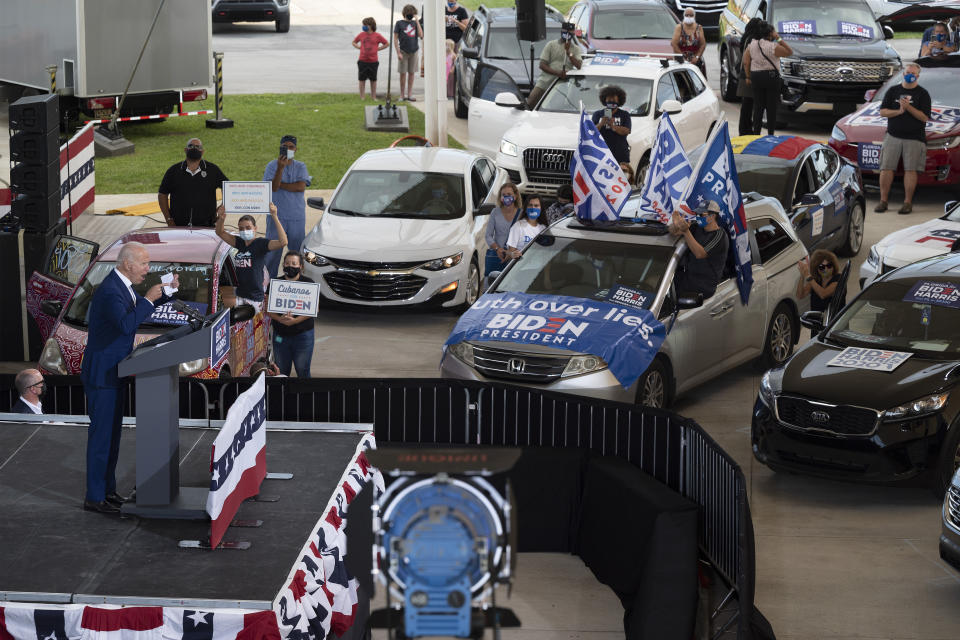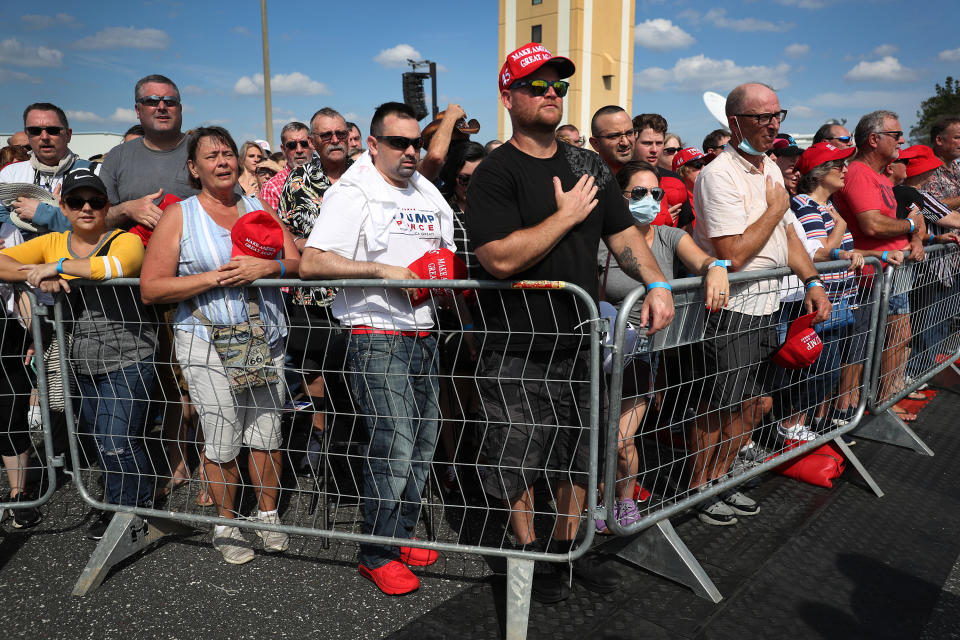Trump, Biden campaigns approach COVID threat very differently
The coronavirus pandemic has dominated the presidential campaign for the last six months, but the issue took on a whole new dimension when President Trump was hospitalized with COVID-19 at the beginning of the month, and dozens of White House and campaign staffers and at least three Republican senators have tested positive for the virus. (Former New Jersey Gov. Chris Christie, who had helped Trump prepare for the first presidential debate, was also hospitalized with COVID and spent a week in intensive care.) Then, just this week, came the news that a senior member of Kamala Harris’s campaign team had tested positive for the virus, leading her to suspend travel and in-person campaign events for several days.
Yahoo News reporters Brittany Shepherd, with the Biden campaign in Wilmington, Del., and Hunter Walker, in Washington, D.C., filed these reports about how the respective campaigns have dealt with the unprecedented threats of the pandemic.
The Biden Camp

On Thursday, Biden campaign manager Jennifer O’Malley Dillon told reporters that two individuals involved in the campaign — a non-staff member of a flight crew and Harris’s communication director Liz Allen — tested positive for coronavirus. The last time either was on a flight with Harris was Oct. 8, the same day Biden and Harris campaigned together in Arizona. Dillon says that neither individual had contact with Biden or Harris within 48 hours of their diagnosis, and neither lawmaker was in close contact with either individual during campaign travel. While Harris tested negative for coronavirus Wednesday evening, the campaign has canceled her travel through Monday out of an “abundance of caution.”
Later Thursday evening, Dillon revealed that a third individual — an employee of the aviation company that charters Biden’s campaign plane — tested positive for coronavirus. While that individual was on Biden’s plane on a recent trip to Ohio, the Biden team said there was no “passing contact” between the two and doctors recommended against a two-week quarantine. Biden is planning to travel to Michigan on Friday.
Joe Biden’s campaign has been adamant that they’ve followed coronavirus mitigation efforts for months and that they’ve been transparent with reporters, in contrast to the Trump administration. In early April, the Biden team convened a dedicated coronavirus public advisory committee to provide science-driven advice for the campaign, which recommended closing the headquarters office in Philadelphia and requiring staffers to work remotely — advice that Biden himself took.
Despite mockery from President Trump and even some criticism from within his own party, Biden opted to sit in the recreation room of his Wilmington home, in front of a by now all-too-familiar bookshelf, and host fundraisers, conduct media interviews, and film promotional videos via the ubiquitous teleconference app Zoom. Trump often goaded Biden to “get out of his basement,” claiming that Biden was not engaging in rallies because he was afraid of the lack of enthusiasm surrounding his candidacy. Biden has hosted over 120 virtual media interviews and 52 virtual events since the onset of the coronavirus, according to a count provided by his campaign.

Biden rebuffed Trump’s barbs by insisting that he was following the guidance of doctors and the CDC, and trying to protect himself, his family and his staff. Then, at the end of August, Biden resumed campaign travel, albeit on a limited basis.
No more rallies. No more rope lines. No more press conferences. In place of the crowds of supporters is a limited pool of traveling campaign reporters, confined to socially distant circles marked on the ground at each event. Sometimes, the campaign hosts drive-in events in which a limited number of supporters can listen to the former vice president and other speakers from the comfort of their car.
The campaign set up rapid testing for reporters and staffers in Wilmington and requires a negative test before any travel or contact with Biden and others. Both Biden and vice presidential nominee Kamala Harris are tested regularly for the coronavirus (although it’s unclear if it’s every day) and the results are given to reporters.
The Biden campaign says they observe individual states’ capacity limits, institute social distancing and require masks at events and during travel.
“Joe Biden understood early on the severity of this global pandemic and its potential to disrupt and devastate American life. He has always listened to the experts and sought to protect others by wearing a mask, observing proper social distancing and moving many of our campaign efforts to virtual, among other things,” Jamal Brown, one of the campaign’s national press secretaries, told Yahoo News in a statement. “That’s what great leaders do, and his actions over the course of this campaign demonstrate what he’ll do as president to address this crisis head-on as our country works to build back better.”
The Trump Camp

President Trump was diagnosed with COVID-19 earlier this month after he and his circle participated in weeks of crowded events with unmasked participants that ignored all expert guidance for minimizing coronavirus risks and, in many cases, seemingly violated local social distancing regulations. The president was one of more than a dozen people linked to those events who tested positive this month. Inside the White House, many, but not all, staff and visitors are given rapid tests. While masks have theoretically been required in the West Wing, the president and members of his team have routinely flouted their own rule.
Following Trump’s treatment and brief hospitalization, it was largely back to risky business as usual in the West Wing and on the trail, with packed rallies and hit-or-miss masking.
Even as close associates on his reelection team, such as campaign manager Bill Stepien, were among those who tested positive, other aides who had worked with them continued to go to their headquarters in Virginia.
On Oct. 8, one week after the president’s diagnosis, White House physician Dr. Sean Conley issued a memorandum to the press declaring that “the President has completed his course of therapy.” Conley also indicated Trump would be ready for a “safe return to public engagements” on Oct. 10, which he described as “day 10” since Trump’s diagnosis. That was in fact just nine days after the president’s positive test and initial symptoms, which meant it was still within the period the Centers for Disease Control recommends COVID-19 patients remain isolated and away from others.
Trump did indeed return to holding events on Oct. 10, including a White House rally where he stood apart from the audience on a balcony.
Trump returned to his regular rallies just two days later with an event before a packed crowd in Orlando, Fla., on Monday that included many people without masks. The president was not wearing a mask as he boarded Air Force One for the flight to the Sunshine State or onstage, where he downplayed the risks of the virus and boasted that he feels “so powerful” following his treatment.

Since then, Trump hit the campaign trail with a vengeance, with rallies in Iowa, Pennsylvania and North Carolina. He also delivered a speech in the Rose Garden on Wednesday and traveled to Florida for a fundraiser and town hall on Thursday evening, followed by additional events on Friday, including a senior rally held indoors.
And Trump isn’t the only one storming the campaign trail without a mask. His campaign has a robust slate of events where surrogates including Vice President Mike Pence and Trump’s sons, Don Jr. and Eric, have entertained large crowds sans masks.
On stage in Iowa on Wednesday night, Trump, who was unmasked, called an attendee onto the stage with him.
“Come here, come on,” Trump said. “I am immune and I can’t give it to you, so that’s good.”
However, that’s not necessarily true. The Centers for Disease Control guidance notes there is currently “limited information about reinfections” and there have been confirmed cases of individuals contracting COVID-19 again after previously recovering from the virus. The CDC recommends that people, like Trump, who have previously been infected “stay at least 6 feet away from others whenever possible, and wear masks.”
Trump has not only gotten close to others onstage at his events. The president, who has a habit of asking reporters to remove their masks when they speak to him, has spoken to the press on the White House lawn while unmasked before leaving for some of his events this week. Onboard Air Force One, Trump and multiple members of his staff have not worn masks. During the flight to Iowa on Wednesday, an unmasked Trump came back into the plane’s press cabin and spoke to reporters there for about 10 minutes.
The White House did not respond to a request for comment about how many staffers have tested positive since last month. According to an ABC News report published Oct. 7, a Federal Emergency Management Agency memo revealed “34 White House staffers and other contacts” had tested positive during the recent outbreak.

Trump’s reelection team is also keeping quiet about COVID-19 risks and safety measures. The campaign did not respond to multiple requests for comment about its coronavirus protocols. Attendees at events this week have been presented with a standard disclaimer designed to protect Trump from legal liability in the event any members of his audience become infected.
“By registering for this event, you understand and expressly acknowledge that an inherent risk of exposure to COVID-19 exists in any public place where people are present,” the disclaimer says. “In attending the event, you and any guests voluntarily assume all risks related to exposure to COVID-19, and waive, release, and discharge Donald J. Trump for President, Inc. … from any and all liability under any theory, whether in negligence or otherwise, for any illness or injury.”
Notwithstanding all his campaigning, Trump continues to trail Biden in the polls.
A former Trump adviser diagnosed the president with a case of imminent election loss in a conversation with Yahoo News this week. Trump famously draws energy from his rallies and the former adviser suggested that the president’s team has set up a robust schedule of events as a form of hospice care for a terminally ill campaign.
“It’s like a patient who’s about to die,” the former adviser said. “They know there’s no turning around, so they're just trying to appease his whims … to keep him comfortable, to keep him happy.”
_____
Read more from Yahoo News:


